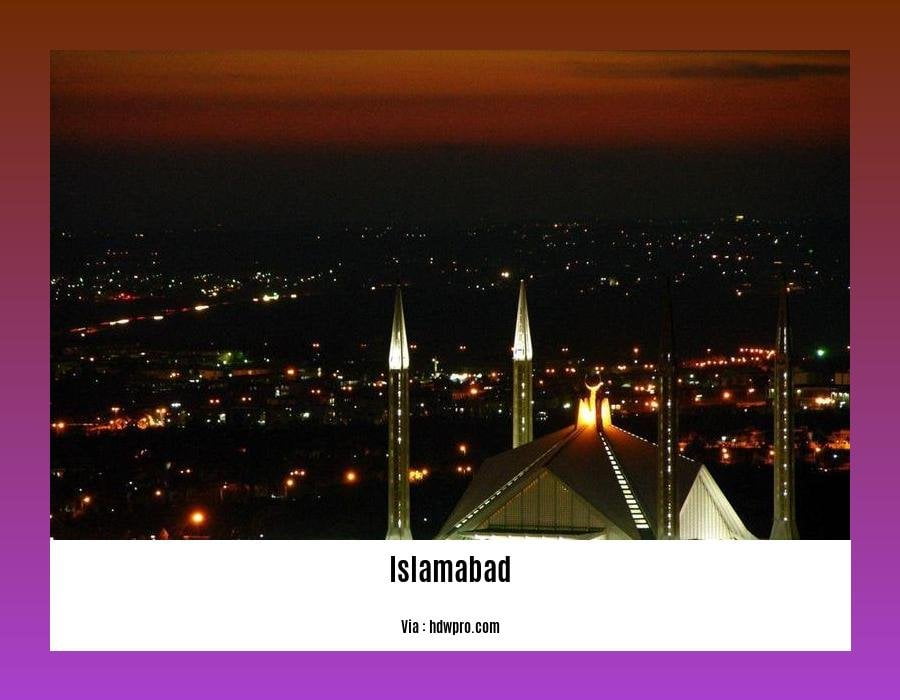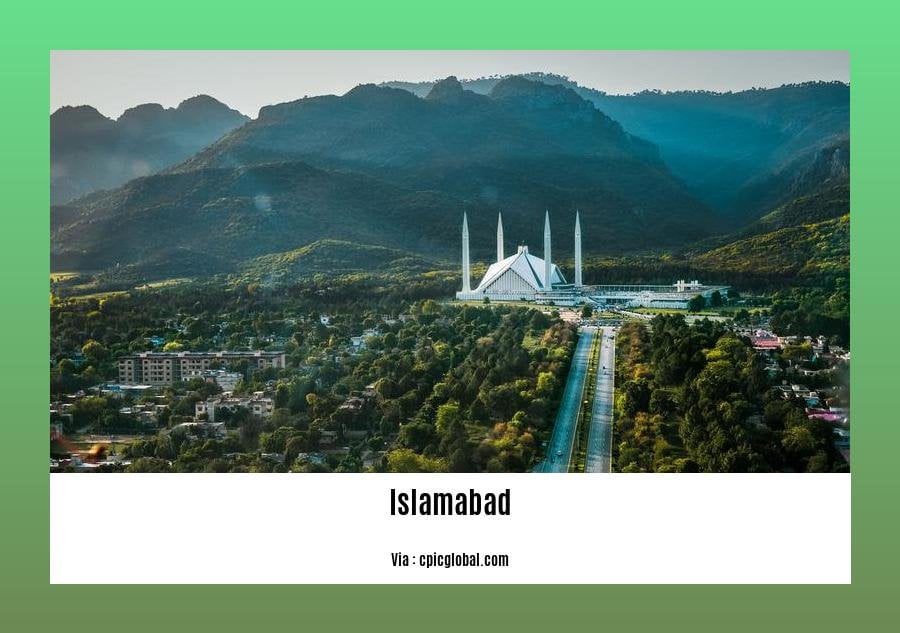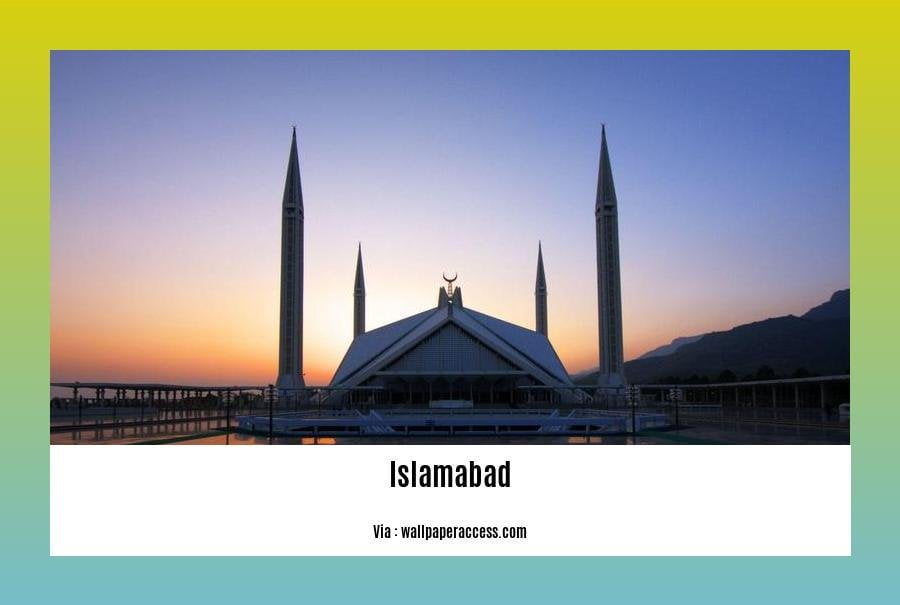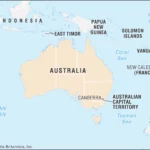Embark on a captivating journey to Islamabad, a city pulsating with rich history, vibrant culture, and enigmatic charm. In this article titled [Unveiling the Hidden Charms: Facts about Islamabad], let’s delve into the lesser-known facets of this captivating metropolis.
Key Takeaways:
-
Islamabad, Pakistan’s capital, is located in the country’s northern region.
-
Greek architect Constantinos Apostolou Doxiadis designed Islamabad, renowned for its well-planned layout and modern architecture.
-
Known for its serenity and natural beauty, Islamabad is set amidst picturesque surroundings and abundant green spaces, offering a tranquil respite.
-
Islamabad serves as a significant diplomatic center, hosting various embassies and international organizations, fostering international collaboration and relations.
-
The city is home to several notable landmarks, including the Faisal Mosque, recognized as one of the world’s largest mosques, showcasing Islamabad’s architectural heritage and religious significance.
Facts about Islamabad

Islamabad, Pakistan’s capital city, is a treasure trove of fascinating facts and hidden gems. Embark on a journey of discovery as we uncover the intriguing facets of this modern metropolis.
A City Designed with a Vision
-
Greek Inspiration: Islamabad’s design was entrusted to the renowned Greek architect Constantinos Apostolou Doxiadis. His vision for a well-planned city led to the creation of wide boulevards, green spaces, and distinct zones for various urban functions.
-
Modern Architecture and Urban Planning: Islamabad’s architecture showcases a blend of modern and traditional styles, with buildings like the Faisal Mosque and the Pakistan Monument symbolizing the city’s contemporary identity. The city’s zoning regulations ensure a harmonious coexistence of residential, commercial, and diplomatic areas.
A Serene Haven Amidst Scenic Beauty
-
Tranquil Retreat: Islamabad offers a tranquil retreat from the bustling urban centers of Pakistan. Its serene atmosphere, coupled with picturesque surroundings, makes it an ideal destination for those seeking peace and relaxation.
-
Verdant Landscapes: The city boasts a captivating fusion of natural beauty and urban development. Margalla Hills, with its lush green slopes and hiking trails, provides a stunning backdrop to Islamabad’s cityscape.
-
Garden City: Islamabad’s reputation as a “garden city” is well-deserved, with meticulously landscaped parks and gardens adorning various neighborhoods. These green spaces offer a sanctuary for both residents and visitors to unwind and embrace the tranquil ambiance of the city.
A Diplomatic Hub and Cultural Melting Pot
-
Diplomatic Enclave: Islamabad serves as a significant diplomatic hub, hosting a multitude of embassies, high commissions, and international organizations. This cosmopolitan atmosphere fosters cultural exchange and fosters diplomatic relations between Pakistan and countries worldwide.
-
International Cuisine and Cultural Events: Islamabad’s diverse diplomatic community contributes to a vibrant culinary scene, offering a range of international flavors and cuisines. The city also hosts numerous cultural events, showcasing the rich traditions and heritage of various countries.
-
Educational Hub: Islamabad is home to prestigious educational institutions, including Quaid-i-Azam University, the National University of Science and Technology (NUST), and the Bahria University. These institutions attract students from across the country and contribute to the city’s intellectual and academic environment.
Landmarks and Icons of Islamabad
-
Faisal Mosque: The Faisal Mosque stands as a symbol of Islamic architecture and is one of the largest mosques in the world. Its distinctive design, inspired by a Bedouin tent, has made it an iconic landmark of Islamabad.
-
Pakistan Monument: The Pakistan Monument symbolizes the unity and brotherhood of the Pakistani nation. Its four main petals represent the country’s four provinces, while the base features murals depicting significant moments in Pakistan’s history.
-
Lok Virsa Museum: The Lok Virsa Museum is a treasure trove of Pakistani culture and heritage. It showcases traditional crafts, music, dance, and rural lifestyles, providing visitors with an immersive experience of Pakistan’s diverse cultural landscape.
Uncover intriguing facts about German culture and discover why it’s a rich tapestry of history, art, and tradition. Facts about German culture
Greece is a land of culinary delights, and its food is a reflection of its rich history and diverse landscape. Facts about Greece food
Kenya’s food is a blend of African, Arab, and Indian flavors, creating a culinary experience that is both unique and delicious. Facts about Kenya food
Islamabad: A Haven of Parks and the Margalla Hills National Park

Key Takeaways:
- Margalla Hills National Park, a verdant expanse of 17,386 hectares, resides within Islamabad, Pakistan.
- Established in 1980, the park engulfs the Margalla Hills, the idyllic Rawal Lake, and the culturally rich Shakarparian Sports and Cultural Complex.
- Its designation as the third-largest national park in Pakistan underscores its grandeur.
- The Margalla Hills, forming the foothills of the mighty Himalayas, invite visitors to embark on invigorating hikes and treks amidst breathtaking vistas.
- Nature enthusiasts will delight in the park’s diverse flora and fauna, spanning over 600 plant species and an array of wildlife, including the gray goral, barking deer, and the elusive leopard.
- Cultural and historical treasures also grace the park, such as the iconic Monal Restaurant, the capacious Shakarparian Cultural Complex, and the serene Lake View Park.
- A testament to Pakistan’s commitment to sustainable tourism, a chairlift project is underway, spearheaded by the Pakistan Tourism Development Corporation.
Nestled within the captivating capital city of Pakistan, Islamabad, lies a treasure trove of parks and green spaces, with the Margalla Hills National Park standing as a crown jewel. This expansive sanctuary, spanning over 17,386 hectares, beckons nature enthusiasts and adventure seekers alike to immerse themselves in its captivating landscapes.
Established in 1980, the Margalla Hills National Park encompasses the majestic Margalla Hills, the serene Rawal Lake, and the vibrant Shakarparian Sports and Cultural Complex, offering a harmonious blend of natural wonders and cultural experiences. Its designation as the third-largest national park in Pakistan speaks volumes about its significance and grandeur.
The Margalla Hills, forming the foothills of the majestic Himalayas, invite hikers and trekkers to embark on invigorating expeditions amidst breathtaking vistas. Whether you’re a seasoned mountaineer or a nature lover seeking tranquility, the hills offer trails tailored to every level of experience.
Beyond its scenic landscapes, the park is a haven for biodiversity, boasting over 600 plant species and a rich array of wildlife. Keep your eyes peeled for the elusive gray goral, the nimble barking deer, and the majestic leopard, as they roam freely within the park’s protected wilderness.
For those seeking cultural immersion, the Margalla Hills National Park offers a tapestry of historical and cultural landmarks. The iconic Monal Restaurant, perched atop the Margalla Hills, affords panoramic views of the city and serves as a culinary haven. The Shakarparian Cultural Complex, with its captivating architecture and vibrant performances, showcases Pakistan’s rich cultural heritage. And the serene Lake View Park provides a tranquil retreat for picnics and leisurely strolls.
In line with Pakistan’s commitment to sustainable tourism, a chairlift project is currently underway in the Margalla Hills National Park, spearheaded by the Pakistan Tourism Development Corporation (PTDC). This eco-friendly initiative aims to enhance accessibility to the park’s breathtaking vistas while minimizing environmental impact.
As you venture into the Margalla Hills National Park, be prepared to be captivated by its diverse landscapes, rich biodiversity, and cultural treasures. Whether you seek adventure, serenity, or a glimpse into Pakistan’s heritage, this park offers an unforgettable experience for every visitor.
Sources:
Margalla Hills National Park
WWF Pakistan: Margalla Hills National Park
The city is known for its diverse population and vibrant cultural scene, with a mix of traditional Pakistani customs and modern influences.
Islamabad, a city teeming with diverse cultures and traditions, warmly welcomes visitors with its vibrant tapestry of Pakistani heritage and modern cosmopolitan influences. This unique blend, evident in its bustling streets and lively cultural landscape, adds to the city’s charm and fascination.
From the vibrant melodies of traditional music to the innovative expressions of modern art, Islamabad pulsates with life and creativity. Dive into the vibrant street markets where skilled artisans showcase their exquisite handwoven textiles and intricately painted pottery, a nod to Pakistan’s rich craftsmanship. Let the mesmerizing rhythm of the dhol, a traditional drum, capture your soul as you witness the graceful twirls of Sufi dancers, their movements a poetic ode to the city’s cultural heritage.
Immerse yourself in the tantalizing flavors of Islamabad’s diverse culinary scene, a delectable fusion of traditional Pakistani cuisine and innovative culinary creations. Savor the mouthwatering aroma of freshly baked naan bread, a staple of Pakistani cuisine, as it pairs perfectly with the spicy yet harmonious blend of flavors in a hearty biryani, a dish that reflects the city’s vibrant cultural mix.
Key Takeaways:
- Islamabad proudly embraces its diverse population, a rich tapestry of cultures coexisting harmoniously.
- Traditional Pakistani customs, deeply rooted in history and heritage, blend seamlessly with modern influences, shaping Islamabad’s unique cultural identity.
- The city’s bustling streets and lively cultural landscape showcase a vibrant fusion of traditional arts, music, and cuisine, captivating visitors with their charm and authenticity.
- Islamabad’s culinary scene tantalizes taste buds with a delectable array of traditional Pakistani dishes and innovative culinary creations, reflecting the city’s diverse cultural influences.
Sources:
[1]
[2]
Islamabad is a major center for education and research, with several prestigious universities and institutions located within the city.
Islamabad, the captivating capital of Pakistan, boasts of a vibrant academic landscape, home to a plethora of esteemed universities and institutions, making it a hub for higher education and research. Step into the realm of knowledge and discover why Islamabad stands out as a beacon of learning and innovation.
Nurturing Minds: Universities of Renown
- Quaid-i-Azam University: A prominent public university known for its distinguished programs in social sciences, humanities, and natural sciences.
- National University of Sciences and Technology (NUST): A leading institution offering exceptional education in engineering, technology, and management.
- COMSATS University Islamabad: A dynamic university excelling in engineering, computer science, and information technology.
- Capital University of Science & Technology: A private university renowned for its programs in engineering, business, and computer science.
- Foundation University Islamabad: A private institution offering a diverse range of undergraduate and graduate programs.
Diverse Fields of Expertise
Islamabad’s universities offer a comprehensive spectrum of academic disciplines, catering to diverse interests and career aspirations. From engineering and medicine to business, social sciences, and humanities, students can embark on a journey of intellectual exploration and personal growth.
Quality Education and Renowned Faculty
These institutions are committed to delivering high-quality education, ensuring that students receive a well-rounded and enriching academic experience. Experienced and knowledgeable faculty members, many of whom are experts in their fields, guide and mentor students, fostering critical thinking, innovation, and a thirst for knowledge.
Research and Innovation: Pushing Boundaries
Islamabad’s universities prioritize research and innovation, providing students with opportunities to engage in cutting-edge research projects and collaborate with industry experts. State-of-the-art research facilities and dedicated funding support foster a vibrant research environment, encouraging students to contribute to the advancement of knowledge and real-world problem-solving.
A Pathway to Success
Choosing to study in Islamabad offers numerous advantages. Graduates from these esteemed institutions are highly sought after by employers, both locally and internationally, due to their strong academic foundation, practical skills, and exposure to cutting-edge research.
Key Takeaways:
• Islamabad is a major center for education and research, with several prestigious universities and institutions offering diverse academic programs.
• Quality education, experienced faculty, and a focus on research create a dynamic learning environment.
• Graduates from Islamabad’s universities are highly valued for their knowledge and skills, enhancing their career prospects.
• The city’s beautiful surroundings, cultural attractions, and potential for better job prospects make it an ideal destination for students.
Citations:
• Top Universities in Islamabad – Edarabia
• Islamabad – Higher Education in Pakistan
FAQ
Q1: Why is Islamabad known as a green city?
A1: Islamabad is often referred to as a green city due to its abundance of parks, gardens, and green spaces. Set amidst picturesque surroundings and verdant valleys, the city boasts stunning natural landscapes.
Q2: What is the significance of the Faisal Mosque in Islamabad?
A2: The Faisal Mosque holds great significance in Islamabad as it is one of the largest mosques in the world. Designed by Turkish architect Vedat Dalokay, its unique and contemporary architecture is inspired by Bedouin tents.
Q3: What are some of the prominent universities in Islamabad?
A3: Islamabad is home to several renowned universities, including the National University of Sciences and Technology (NUST), COMSATS University, Quaid-e-Azam University, and Capital University of Science & Technology. These institutions offer a diverse range of undergraduate and graduate programs.
Q4: What makes Islamabad an attractive location to live in?
A4: Islamabad offers a high quality of life with its modern infrastructure, well-planned layout, and a peaceful environment. The city is also a diplomatic hub, hosting numerous embassies and international organizations.
Q5: What are some of the unique cultural aspects of Islamabad?
A5: Islamabad’s diverse culture is reflected in its vibrant art scene, traditional festivals, and local cuisine. The city is home to numerous cultural centers and theaters, and hosts regular events that showcase its rich heritage and traditions.
















